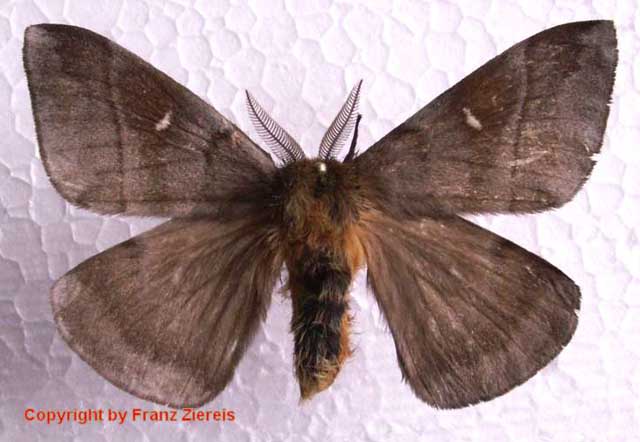Ormiscodes cognata
Ormiscodes cognata
Philippi, 1859

Ormiscodes cognata male, courtesy of Franz Ziereis.
TAXONOMY:
Superfamily: Bombycoidea, Latreille, 1802
Family: Saturniidae, Boisduval, [1837] 1834
Subfamily: Hemileucinae, Grote & Robinson, 1866
Tribe: Hemileucinae, Grote & Robinson, 1866
Genus: Ormiscodes, Blanchard, 1852
|
MIDI MUSIC
"Someone to Watch
Over Me"
copyright C. Odenkirk
MIDI CITY
ON.OFF
<bgsound src="watch.mid" LOOP=FOREVER>
|
DISTRIBUTION:
The Ormiscodes cognata moth
(wingspan: males: 60-78mm; females: 83-91mm) flies in southern
Chile:
Valdivia; Osorno; Llanquihue; Isle de Chiloe; Magallanes and in
southwestern Argentina: Neuquen;
Rio Negro; Chubut; Tierra del Fuego and probably Santa Cruz.
The forewing is yellow beige to yellow brown, or even orange brown to
dark brown, darker than O. cinnamomea.
This species lacks the white scaling
(present in O. cinnamomea) on the facing sides of
the antemedian and postmedian lines.

Ormiscodes cognata female, on my home computer only.
FLIGHT TIMES AND PREFERRED FOOD PLANTS:
Ormiscodes cognata is probably single brooded throughout most,
if not all, of its range. Adults are likely on the wing from
February to June with larvae evident between March and October.

Ormiscodes cognata male, 73mm, on my home computer only.
ECLOSION, SCENTING AND MATING:
Females extend a scent
gland from the tip of the abdomen, and the night-flying males pickup
and track the airbourne pheromone plume with their well-developed
antennae.
Adults rest during the day on the foliage or trunks of
pines or other hosts, flying only at night. Both males and females
respond to light.
EGGS, LARVAE, COCOONS AND PUPAE:
Early instar larvae
typically feed gregariously. Late instar larvae become more widely
dispersed on host trees and understory vegetation.
Larval Food Plants
It is hoped that this
alphabetical listing followed by the common name of the foodplant will
prove useful. The list is not exhaustive. Experimenting with closely
related foodplants is worthwhile.
Use your browser "Back" button to return to the previous page.
Return to Ormiscodes Genus
Return to South American Saturniidae Directory
Return to Main WLSS Index



